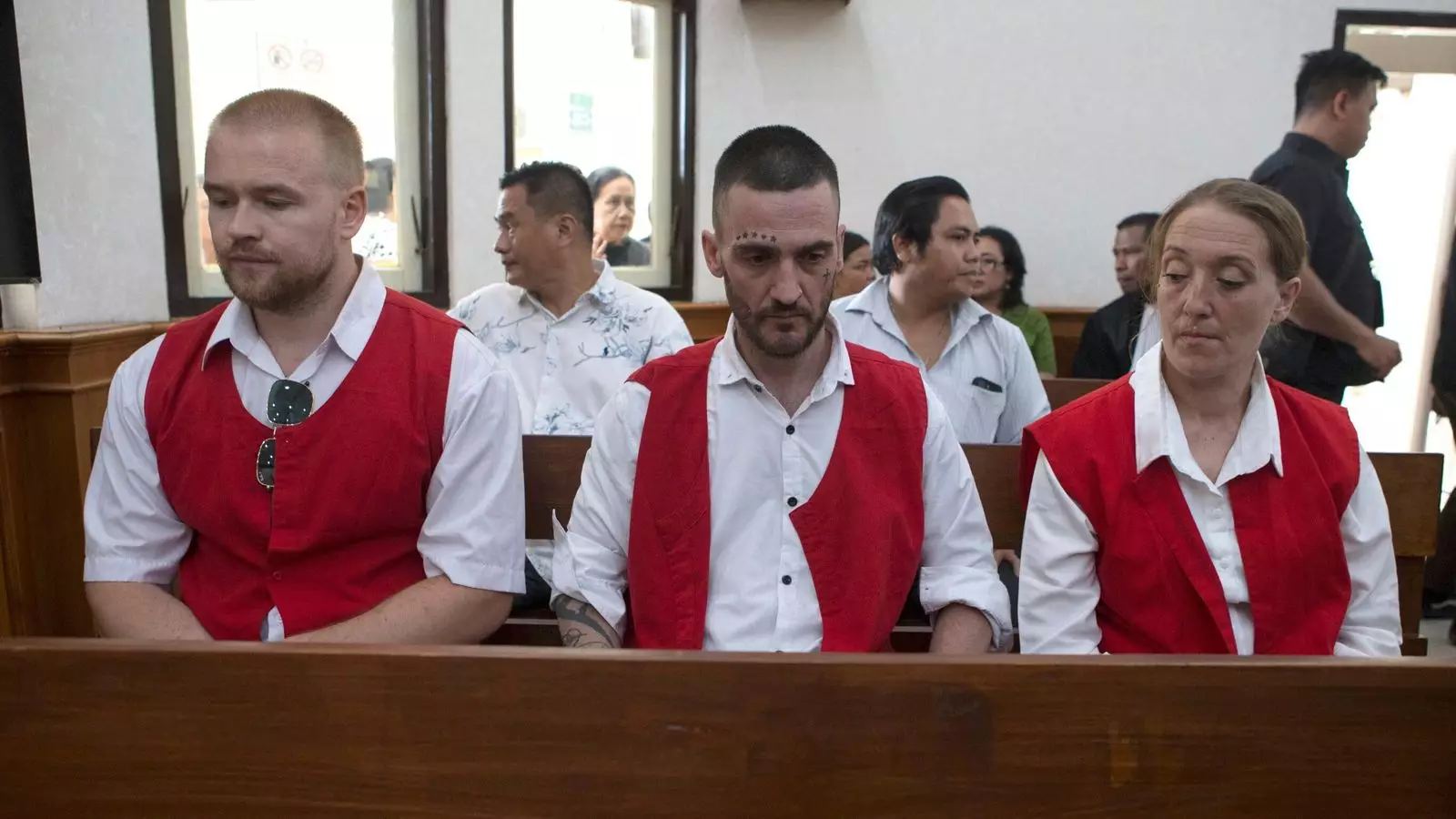As global drug trafficking networks evolve, the risks associated with smuggling have reached staggering heights. The recent case involving three Britons—Jonathan Christopher Collyer, Lisa Ellen Stocker, and Phineas Ambrose Float—stands as a chilling example of this perilous game. Arrested in Bali for smuggling nearly a kilogram of cocaine, their fate hangs in a precarious balance as they face the wrath of Indonesia’s ruthless drug laws. The potential imposition of the death penalty, a reflection of Indonesia’s unforgiving stance on drug crimes, raises significant moral and ethical questions about justice and human rights in the face of addiction and despair.
Despite being a popular tourist destination, Bali’s reputation has been tarnished by the harsh realities of drug trafficking and its ensuing penalties. The staggering discovery of 993.56g of cocaine hidden within seemingly innocuous snack packages highlights a cunning sophistication among smugglers. Prosecutors assert that this group has previously succeeded in bringing drugs into this tropical paradise—a testament to their disregard for the consequences. While my inclination is to condemn drug smuggling, the broader implications of these punitive measures pose a serious threat to the principles of justice and human dignity.
Death Penalty: A Policy in Question
Indonesia’s legal system, particularly its approach to drug offenses, is an outlier in the modern world. With a staggering 530 individuals, including numerous foreigners, on death row for drug-related crimes, it’s clear that the state operates under an extreme model of deterrence. Caught in this web are individuals from diverse backgrounds, often lured into trafficking out of desperation or ignorance. The chilling reality is that the execution of smugglers, like Lindsay Sandiford, who has languished on death row since 2012, serves as a grim reminder of Indonesia’s staunch commitment to its draconian laws.
Opponents of the death penalty argue that executing drug offenders neither effectively diminishes drug trafficking nor addresses the root causes of addiction. The very existence of Indonesia as a drug-smuggling hub contradicts the rationale behind such punitive measures. International drug syndicates continue to exploit vulnerable populations, casting a shadow over the island’s serene facade. The cycle of punishment is accentuated by poverty, lack of education, and inadequate mental health resources, ultimately leading to a revolving door of crime and punishment.
A System of Injustice?
The stark reality of these legal proceedings exposes a troubling aspect of Indonesia’s penal system: the nefarious intersection of justice with socio-economic disparities. For many accused, the label of “druggie” becomes not just an indictment but also a social stigma that can redefine their existence. The recent case involving Thomas Parker further complicates the narrative. Initially faced with charges that could result in the death penalty, Parker ultimately saw those charges reduced—likely owing to his ability to prove his innocence. This raises the question: is justice truly blind, or is it swayed by privilege and circumstances?
The consistency with which these brutal sentences are applied creates a climate of fear among those interested in either visiting or residing in Indonesia. The idea of losing one’s life over a moment of poor judgment is harrowing enough, yet the reality remains that such consequences often collide directly with issues surrounding mental health and social support. While addiction is aptly labeled a disease, those often caught in its clutches face the heavy hand of the law without sufficient avenues for rehabilitation.
A Call for Compassionate Reform
To move forward, a re-evaluation of Indonesia’s anti-drug policies is crucial. The urgent need for reform is underscored by numerous international human rights organizations calling for the abolition of the death penalty. The world must advocate for strategies that prioritize treatment over execution, supportive rehabilitation rather than retaliatory punishment. It’s time for Indonesia to pivot from its draconian stance, recognizing that the framework of justice should embrace rehabilitation, education, and the empowerment of individuals over mere retribution.
In a global context, it’s essential to foster dialogue promoting compassion rather than condemnation. The debate surrounding drug laws must move beyond cultural judgments, focusing instead on universal principles of dignity and human rights. The misfortunes of Collyer, Stocker, and Float are indicative not just of personal folly but also of a larger systemic failure. Let us seize this opportunity to engage in meaningful discussions about reform, ensuring that justice does not become a mere tool for punishment but a pathway to understanding and healing.


Leave a Reply